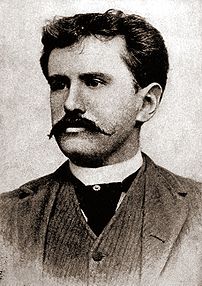 Image via Wikipedia
Image via Wikipedia O. Henry's stories are full of irony. His stories focus on the base aspects of human nature: poverty, crime, dying. And yet they focus on self-improvement and the "love your neighbor" aspects of human nature. The characters in O. Henry's stories were mostly loving, and the endings were poignant and "tender."
O. Henry was born William Sidney Porter and became O. Henry after a few years in prison, during which time he turned to his writing. I'm glad he did write because I really enjoyed his stories! My favorites were these (links to public domain etexts):
- The Gift of the Magi. $1.87 is all she had on Christmas Eve, and yet she wanted to buy her husband a Christmas gift.
- The Cop and the Anthem. A homeless man wants to be arrested so he can be in jail all winter.
- The Last Leaf. She knows she will die when the last leaf falls from the vine.
- The Ransom of Red Chief. Two criminals need $2,000, so they determine to kidnap the son of the richest man in town and hold him for ransom.
The Writing
O. Henry's writing is perfectly acceptable: it's probably a style issue for me. O. Henry is a down-to-earth writer, and his writing seemed to have a more conversational aspect. For example, in "The Gift of the Magi," the woman begins to cry in the first paragraphs. Then,While the mistress of the home is gradually subsiding from the first stage [sobs] to the second [sniffles], take a look at the home.Now, there is technically nothing wrong with addressing the reader. But since I recently read James Joyce, who was careful to develop a scene, and Ernest Hemingway, who never would use so many words to describe something, for me it was just a surprising sentence to read.
Also, along the same line, O. Henry told his stories, but none of the characters seemed developed. Even after finishing "The Ransom of Red Chief," for example, I barely know about the two kidnappers and the young boy; they remained stereotypes in a clever story. On the other hand, while Joyce seemed long-winded in some respects and his stories were somewhat depressing, the characters and settings were so beautifully created that I didn't mind reading it.
I read this right after reading Hemingway, so maybe if I'd waited a few days after Hemingway, O. Henry's writing style wouldn't have been as noticeable; I would have just enjoyed the stories.
The bottom line is I really enjoyed O. Henry's stories, and after my disappointment in Hemingway, I really needed something like this.
If you want to read some "tender" (and, yes, I admit, somewhat cheesy) "love your neighbor" stories, you should really give O. Henry a try. Read his stories online in the public domain at Project Gutenberg; most are fairly short.
Cross-posted in slightly different form here.


No comments:
Post a Comment